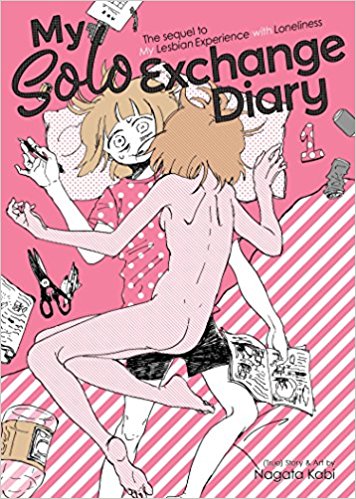By Nagata Kabi. Released in Japan as “Hitori Koukan Nikki” by Shogakukan, serialized in Big Comic Special. Released in North America by Seven Seas. Translated by Jocelyne Allen. Adapted by Lianne Sentar.
When we last left Nagata Kabi, she had been telling us about the experiences of her depression and the exploration of her sexuality, and how she ended up using the (sometimes very painful and raw) experiences to create a manga volume. Well, the manga was a hit. Possibly a bigger hit than the author was expecting. Now she’s being asked to do an ongoing series with a larger publisher, and being influenced by her followers on Twitter, and trying to move out of her family home. Oh yes, and still dealing with the depression and sexuality, neither of which has been made any easier by her sudden success. If My Lesbian Experience with Loneliness ended on a hopeful note, this second volume shows us that there are no easy, magical outs, and that sometimes you know exactly what needs to be done and yet can’t quite do it.
This volume focuses more on interpersonal relationships. Nagata, like most people, craves contact with others, but that’s easier said than done, and even when she gets what she wants she’s not sure how to act or react, and her emotions aren’t the ones she should be having. This extends to her family as well. She’s able to understand her mother better and realize that she is also going through many of the same things, but that does not necessarily extend towards being able to help her – Nagata wants to help herself first. Which means moving out, though she finds that’s not something to be done at the spur of the moment. And at the end of the book, she even manages to go out on a date with another girl, but this too is hampered by her depression and self-esteem, as she realizes she’s only focusing on herself and not the other person.
Again, I’ve never dealt with serious depression, but nevertheless a lot of Nagata’s monologues and advice to herself struck a chord with me. Her chapter on self-esteem and how to measure yourself against others was particularly good, and the tension and anxiety that went with “how do I tell my parents about my manga?” leapt off the page. (We do also, by the way, revisit the escort agency that Nagata went to the first time, and it’s possibly the most helpful thing to happen to her in the book – even though it’s just hugging, the physical affection alone lets her take a conceptual leap forward in terms of what she wants.) There’s a reason that Nagata’s stories got so popular, which is that she is very good at being able to take her life, her worries and anxieties, and get it down onto the page in a way that a reader will identify with it and root for her. And you want to root for her, want to see her do better, even as you read on and see everything that is pulling against that.
Essentially, if you read My Lesbian Experience with Loneliness and got something out of it, you’ll definitely want to pick this up, and I’ll be getting the next volume to see how Nagata is doing.

